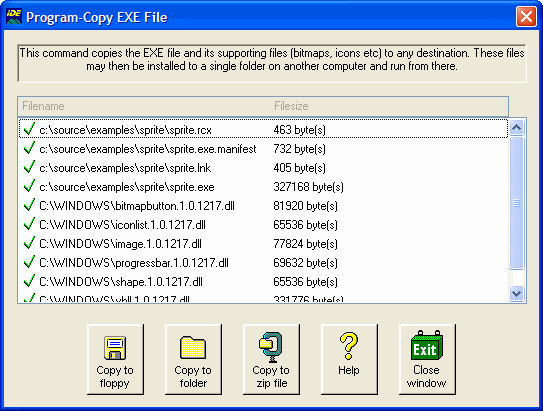Programs to write EXE files for Windows
| Home page |
| What is Uberbot |
| What is Ubercode |
| Free trial |
| Ubercode store |
| Testimonials |
| Tech support |
| Forum |
| Links |
| News blog |
1. How do I distribute my EXE files (programs)?Ubercode programs consist of EXE files, DLL files and extra files that contain windows, forms, dialog boxes and so on. The Ubercode Developer Environment makes it easy to copy programs onto removeable disks or onto other computers. First use the Run - Quickbuild EXE File command in the Ubercode Developer Environment to bring all the files up to date. Then use the Program - Copy EXE File command. This shows a list of all the files in the program that need to be copied. Files have a green tick next to their name if the file exists:
Now choose how you want to copy the files. Copying to floppy disks is useful for copying programs to earlier computers. Copying to a folder is useful for running programs across a network. Copying to a zip file is useful for emailing programs, or for programs with files too large to fit on floppy disks. Click the button to copy the EXE files. The command includes all the files required to run the program on another computer. The files run on any Windows PC, from Windows XP all the way back to Windows 95. When running the files on another computer, create a new folder and copy the files there. You don't need to modify the registry or store any files in the Windows system directory to run Ubercode programs. If you want a more elaborate setup system that creates directories, shows banners, adds program groups, shortcuts etc, there are tools such as InstallShield that do this. Please note the Standard Pack and Professional Pack are required when creating programs to copy to other computers. To check the package details, look on the CD label, or the product packaging, or use the Help - About command in the Developer Environment. Although the Trial Pack is able to copy the EXE files in the same way as other packages, the resulting disks / folders / zip files are not licenced for running on other computers. 2. How do I know what files to include in my programs?Use the View - Output Files command in the Ubercode Developer Environment to see a list of files needed to run the current program. For example if your main class is "myapp.cls" the following files are typically needed:
If you are using the Ubercode Standard Pack or Ubercode Professional Pack, you can distribute a program using the Program - Copy EXE File command. This automatically copies the files, ready for installation on the new computer. Ubercode does not require any registry entries, and no system DLLs need to be replaced. This avoids problems with "DLL Hell" or "Framework Hell" which are not nice places. Please note the Trial Pack is licenced for testing and evaluation of Ubercode only. It is not licenced for making EXE files for distribution to other computers. The Standard Pack or Professional Pack are required for this. 3. How do I put a link to an EXE file on my desktop?The basic process is you create a short-cut to your program, then copy the short cut file to the Windows desktop. Use the following steps:
4. How do I use an installer to copy my EXE files to another computer?You can do this using the Ubercode Professional Pack. Start the Developer Environment, open your program and recompile it. Then use the Tools - Create Program Installer menu command which brings up a dialog used for configuring the built-in installer. The installer allows you to choose the text shown during the installation process, the destination of the installation, and whether an icon is placed on the desktop of the computer being installed to. When this information has been set up, click the Create button to go ahead and create the installer. After the installer is created, it exists as a single packaged EXE file with all the files and commands needed for installing on the destination computer. You can copy this EXE file to a CD-ROM, email it to your customers or put it on your website for downloading. Anyone with the packaged EXE file can install and run your program simply by running the EXE file. 5. Where is the run time library installed?Whenever Ubercode programs run, the DLLs are loaded with the Windows LoadLibrary function, which looks in:
The easiest way is to put the DLLs in the same directory as the EXE. This is only wasteful if you have several Ubercode applications installed on a machine, as it duplicates the DLLs. In this case the best way is to put them in the windows directory. Ubercode DLLs are versioned using their file names, which guarantees programs always use the correct DLLs. For example a program compiled with Ubercode version X.Y always uses the DLL corresponding to version X.Y, and no other DLL. Therefore multiple Ubercode programs of different versions can run on the same computer using the correct DLLs without conflict. |
